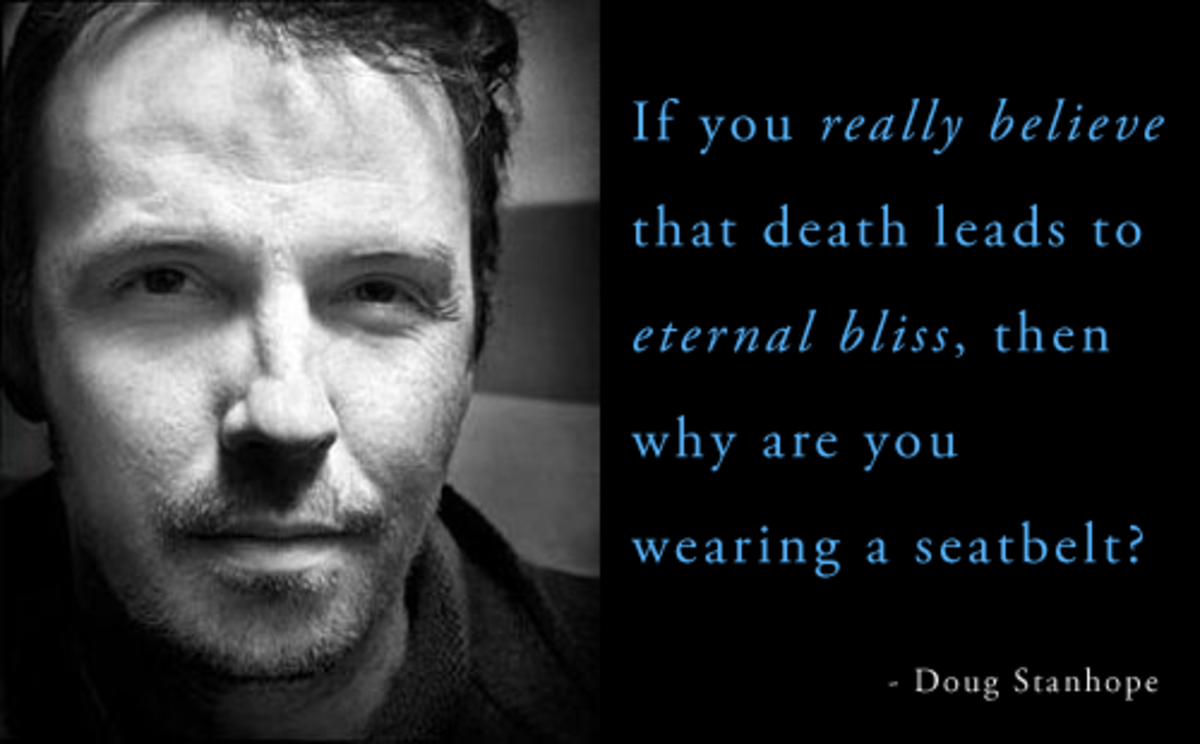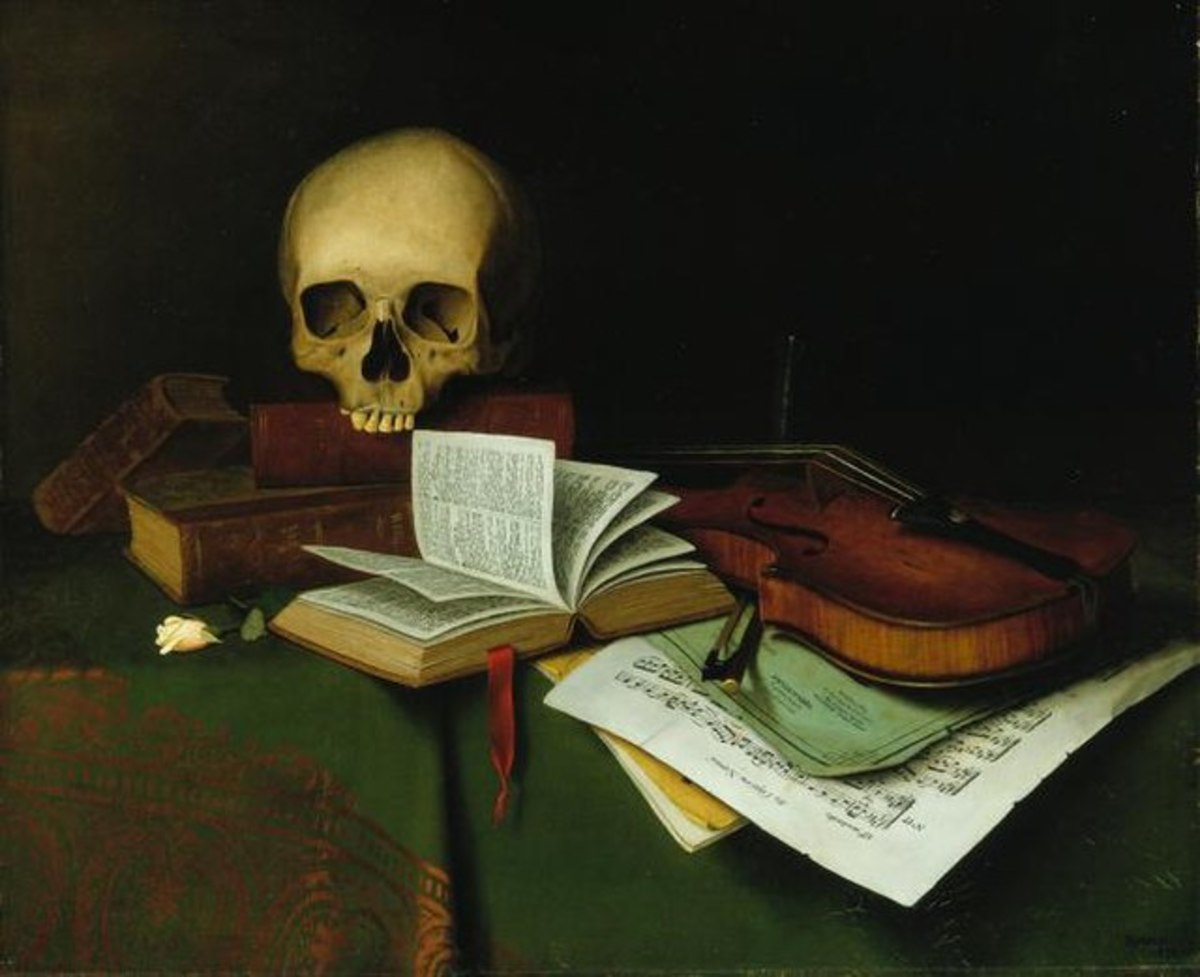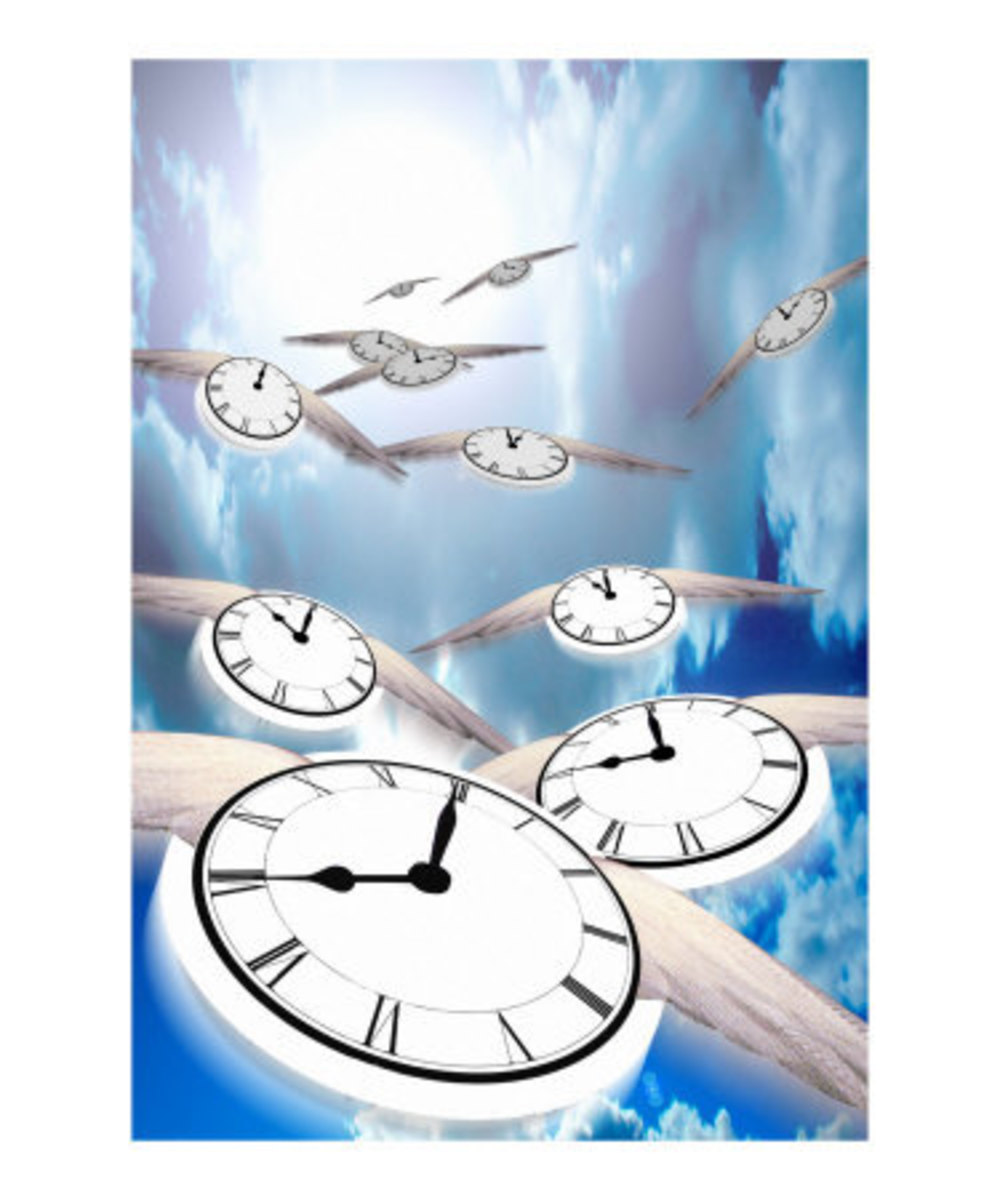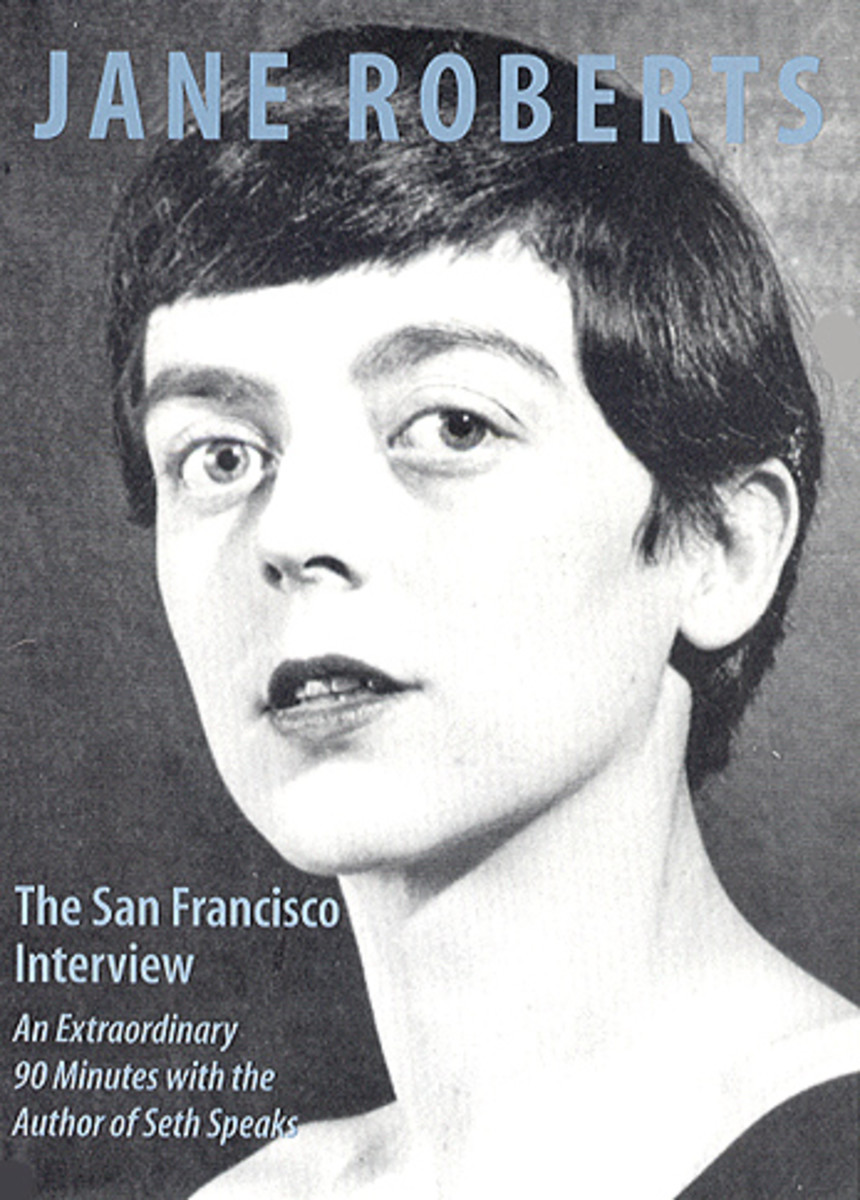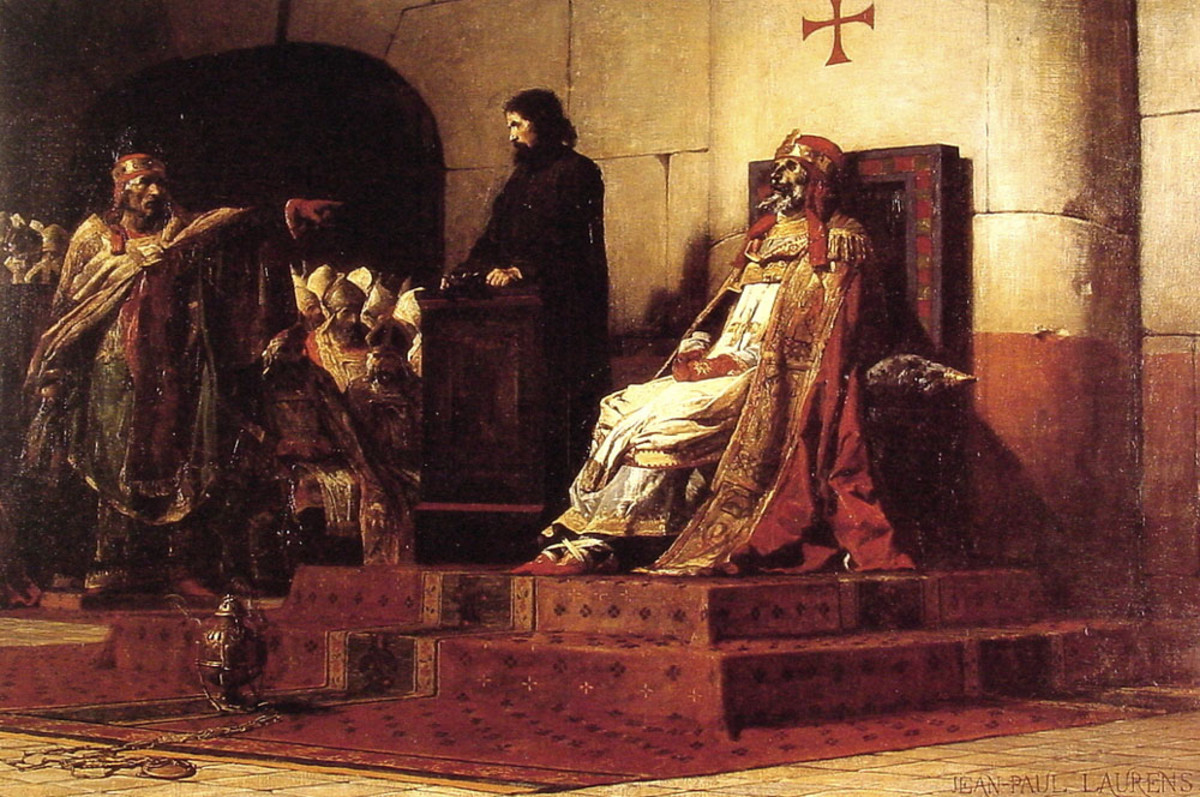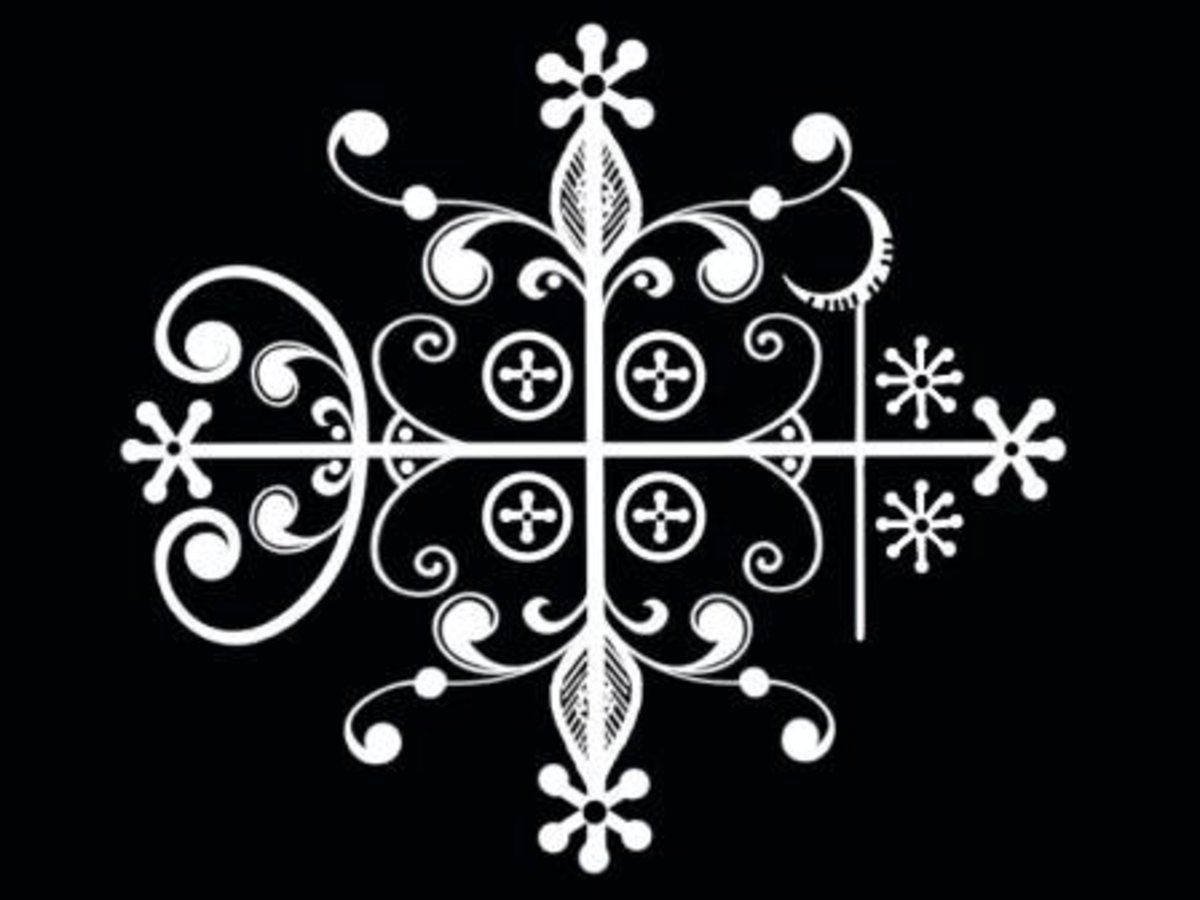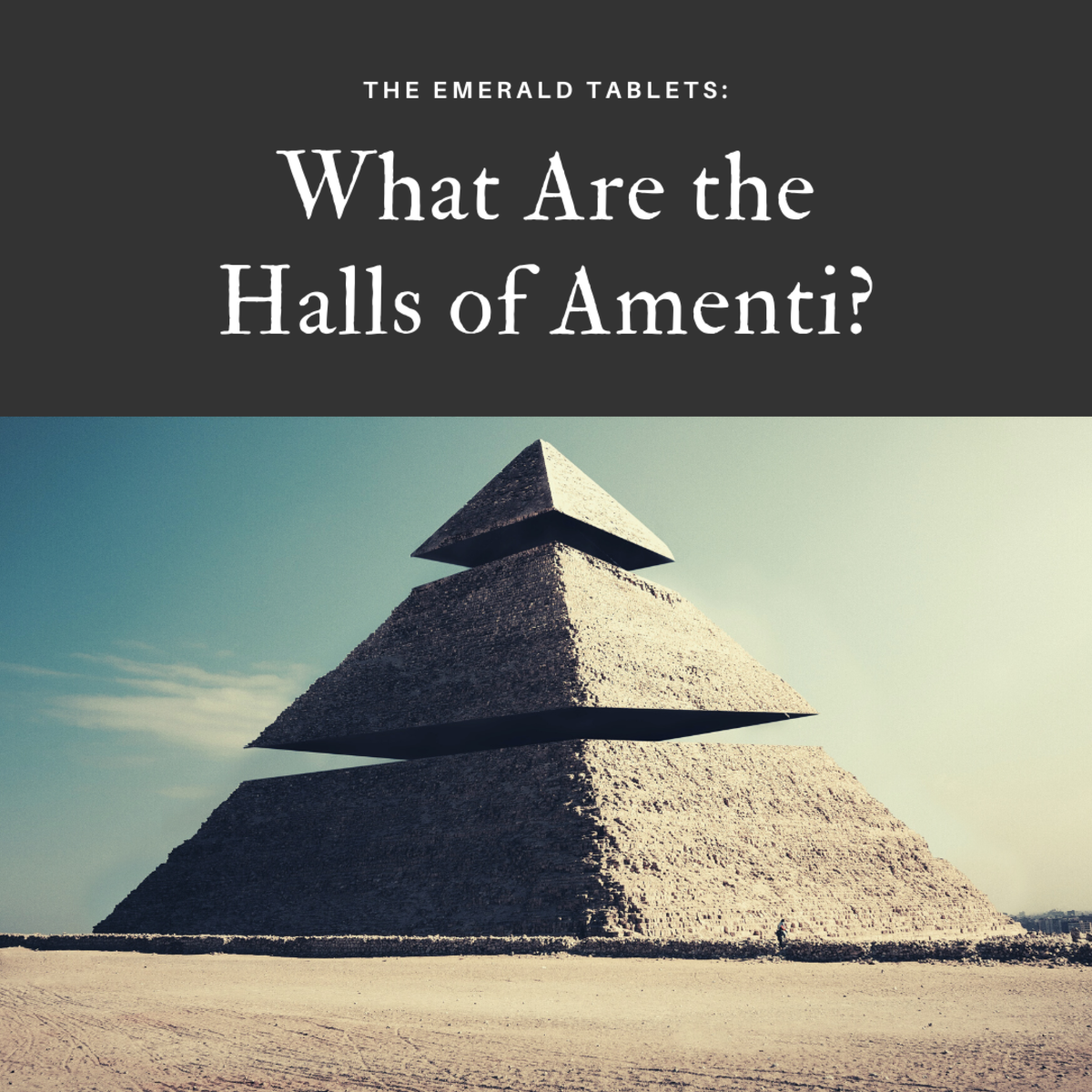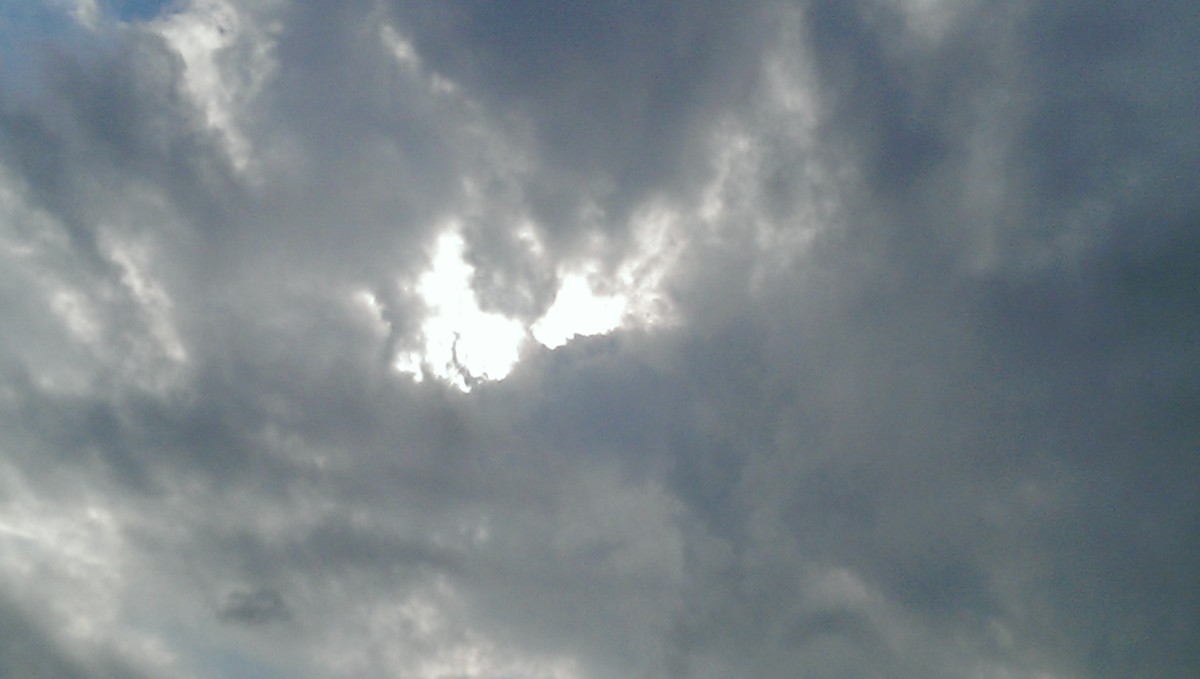Pantheism vs. Catholicism

It is interesting to look at how others see us. While doing a search for Pantheist web sites on the net, I ran across the Vatican’s own definition and rebuttal to Pantheism.
Much of what the web page has to say in terms of definition is just true enough to pass with someone with not too much knowledge of the subject, and the rather brief history included in the text is somewhat educational. Therefore, reading the entire text is not a complete waste of time. I have provided a link to the original text on the side bar of this hub.
That being said, there are points of contention I must address; particularly as applies to Rational, Scientific, and Naturalist Pantheism.
As I said, the Catholic definition is partially accurate. The opening line of their definition is a bit misleading, or perhaps just understated. They define Pantheism as: “The view according to which God and the world are one.”
More exactly, one would have to say that the universe is one system made up of systems within systems. The idea that god and the world are one is not exactly a Rational Pantheist concept. Perhaps had they said that god and the universe are one, they would have been closer to the truth of the matter.
The document goes on to say:
“ The name pantheist was introduced by John Toland (1670-1722) in his "Socinianism truly Stated" (1705), while pantheism was first used by his opponent Fay in "Defensio Religionis" (1709). Toland published his "Pantheisticon" in 1732. The doctrine itself goes back to the early Indian philosophy; it appears during the course of history in a great variety of forms, and it enters into or draws support from so many other systems that, as Professor Flint says ("Antitheistic Theories", 334), "there is probably no pure pantheism".”
If the purity of Pantheism is in its adherence to the idea that: “All Is One Divided” then Rational and Scientific Pantheism are the pure forms of Pantheism. While it is true that Pantheism has its roots in the history described above, it has gone beyond those rudimentary and basic ideologies and can now answer the concerns of Catholicism and Christianity in general, as I shall attempt to do here. It is noted that neither Rational, Scientific, nor Naturalist Pantheism, is mentioned on these pages. Perhaps it’s because the Church really doesn’t understand Pantheism as well as it believes it does. Perhaps this is just a dated document.
“Taken in the strictest sense, i.e. as identifying God and the world, Pantheism is simply Atheism.”
And of course I couldn't agree more with the conclusion of this statement. Pantheism is an atheistic philosophy.The text then goes on to talk about the various forms of Pantheism:
“These (all varieties of Pantheism) agree in the fundamental doctrine that beneath the apparent diversity and multiplicity of things in the universe there is one only being absolutely necessary, eternal, and infinite. Two questions then arise: What is the nature of this being? How are the manifold appearances to be explained? The principal answers are incorporated in such different earlier systems as Brahminism, Stoicism, Neo-Platonism, and Gnosticism, and in the later systems of Scotus Eriugena and Giordano Bruno (qq.v.).”
The first part of this is blatantly wrong. While some forms of Pantheism do believe in an imminent god, not many believe it’s a being. That in itself makes both questions posed by the church, meaningless. However, I will explain this in theistic terms so that theists may get a better understanding of the topic. The nature of the totality is the combined nature of all things. The manifold appearances are due to the nature of the one substance “energy/matter”. Energy cannot be destroyed nor created. It can only be transformed. God, in Pantheist view, is the process of existence itself.
While Brahmanism and the rest have some Pantheistic traits, they are not Pantheism. The church may ask these questions of those religions, but they are actually meaningless when asked of Pantheism, and again show a lack of knowledge of the subject.
“Spinoza's pantheism was realistic: the one being of the world had an objective character. But the systems that developed during the nineteenth century went to the extreme of idealism. They are properly grouped under the designation of "transcendental pantheism", as their starting-point is found in Kant's critical philosophy. Kant had distinguished in knowledge the matter which comes through sensation from the outer world, and the forms, which are purely subjective and yet are the more important factors. Furthermore, he had declared that we know the appearances (phenomena) of things but not the things-in-themselves (noumena). And he had made the ideas of the soul, the world, and God merely immanent, so that any attempt to demonstrate their objective value must end in contradiction. This subjectivism paved the way for the pantheistic theories of Fichte, Schelling, and Hegel.”
The Pantheism of today would agree with Kant in the idea that we know the appearance of things but not the things in themselves. In Pantheism there is but one reality, however, we humans interpret it in many diverse ways. We come to the world with no knowledge whatsoever $6 and have to come to know it through our conditioning and according to our genetic predispositions. After all, we can describe perfectly what an electron does, but what is it? You can come to a million different definitions of what it does, but they only describe its behavior, they never tell us what anything really is.
Looking at a human we see flesh and form. But when looked at under a microscope the skin begins to look like an alien landscape. Looking deeper it becomes more rugged still. Soon we begin to see minute insects inhabiting our human planet, and eventually we see a world filled with bacteria. When we start seeing individual cells we have to conclude that many living things make up the one human. It is not a solid mass. If cells were the lowest level, that would be one thing. But they are not. Humans and all things are made of atoms. If we could look at a human from that perspective, it would be hard indeed to tell where the outside world ends and the human begins. From the vantage point of the moon and a good telescope, we might look like a virus invading the earth. Which is the real perspective, and which is the illusion?
Perhaps more correctly, the question should be: Are any of these perspectives the real one, or are all the perspectives part of the whole, and one as valid as the other, relative to the specific perspectives vantage point? For the Pantheist this last explanation is perhaps the most satisfying.
It is also quite obvious that the church doesn’t understand duality, even though its scriptures and concept of a trinity are full of contradiction which they are only too happy to resolve for themselves. Nor does it understand how to resolve duality without depreciating one side or the other. Few religions do, of course. The exceptions are Daoism, Pantheism, and of course, Zen. While in Zen, resolution of duality is a main focus, in Pantheism it’s not a requirement, but is part of the deeper realizations of the world view. In other words, a greater understanding of duality is often a by-product of understanding the greater implications of Rational or Scientific Pantheism.
In Scientific and Rational or Naturalist Pantheism god is not imminent in all things, it is all things. All things are part of the process of existence, so god is in no way separate from the totality. So again, the Church is mislead and not in touch with the current form of Pantheism.
“Fichte set back into the mind all the elements of knowledge, i.e. matter as well as form; phenomena and indeed the whole of reality are products of the thinking Ego-not the individual mind but the absolute or universal self-consciousness.”
Pantheism does not believe in a universal consciousness, let alone a self-consciousness. This kind of thinking is now considered Panentheism. Some Christians identify with Panentheism.
”According to Schelling, the Absolute is the "identity of all differences"-object and subject, nature and mind, the real order and the ideal; and the knowledge of this identity is obtained by an intellectual intuition which, abstracting from every individual thinker and every possible object of thought, contemplates the absolute reason.
The problem being that not all thinkers are correct, not all thoughts logical. I don’t really like Schelling’s analogies. What he is saying in essence is that all thoughts put together is the absolute truth, and this is very confusing for most people. I also don’t believe it’s correct. It completely misses the idea that some thoughts are mistaken. All thoughts put together might give a better picture of underlying reality, but together they do not produce an “absolute reason”
Because ideas either do or do not reflect reality, those that do not reflect reality are fantasy or misunderstanding. Eliminating them is a way to reason. Perception in and of itself is irrelevant to what reality is. Perception does not alter reality, though it may alter how an individual reacts within reality. It’s not the same thing. Absolute reason can only exist when incorrect perception of reality is eliminated, and that’s not something that’s easy to do without absolute knowledge.
Current Pantheism is, as I have stated before, science based. As such it recognizes that there are few absolute answers, and unlike the Church admits no one and nothing has absolute knowledge or anywhere close.
“History is but the gradual self-revelation of the Absolute;”
I would agree. I think the essence of Pantheism is served well with that statement. But not based on the idea that all thought and perception of reality, correct or not, is a contemplation of absolute reason. Yes, if Schelling is using the term: absolute reason as way to say god, then misunderstanding is part of the process of existence and thereby part of god. But one of the aspects of the process of existence is conflict resolution. In fact it is the basis of much of evolution. The Christians believe in a conscious and perfect god. Pantheism does not. Pantheism sees god as a process which works on the basis of working out conflict and finding resolutions to it.
However, on principal, misunderstanding and fantasy perceptions are not helpful to humans who are looking for the truth.
“when its final period will come to pass we know not; but when it does come, then God will be. “
This is another implication of Pantheism. I would describe it thus: It is the idea that the theist doctrines are backwards. The process of existence was not set into motion by a god; but rather, the process of existence is god attempt to create a god-state. In other words, it’s not that a god created us, but rather that we, all things, through our interactions, are creating a god-state or state of perfection. An ultimate resolution to conflict. This idea doesn’t sit well with the church. While this is an implication of Pantheism, one has to realize the absolute enormity of such an attempt. Most of us see a tendency toward perfection in the totality, but few of us would say it is attainable, nor that it is a conscious goal.
“The system of Hegel (q.v.) has been called "logical pantheism", as it is constructed on the "dialectical" method; and "panlogismus", since it describes the entire world-process as the evolution of the Idea. Starting from the most abstract of notions, i.e. pure being, the Absolute developes first the various categories; then it externalizes itself, and Nature is the result; finally it returns upon itself, regains unity and self-consciousness, becomes the individual spirit of man. The Absolute, therefore, is Mind; but it attains its fulness only by a process of evolution or "becoming", the stages of which form the history of the universe.”
There are a few problems with Hegel from the Rational Pantheist viewpoint. One of the biggest problems philosophically is the idea that mind is the be all and end all of existence. Hegel, again, does not represent current Pantheist thinking.
“These idealistic constructions were followed by a reaction due largely to the development of the natural sciences. But these in turn offer, apparently, new support to the central positions of pantheism, or at any rate they point, it is claimed, to that very unity and that gradual unfolding which pantheism has all along asserted. The principle of the conservation of energy through ceaseless transformations, and the doctrine of evolution applied to all things and all phenomena, are readily interpreted by the pantheist in favour of his own system.”
I couldn’t agree more. And why should we not state the obvious? The theory of conservation is a very good place to start seeing how it all works. Physics in particular shows unity in all things, but all the sciences do in their own way.
The church then goes on to summarize its definition of Pantheism.
“Reality is a unitary being; individual things have no absolute independence- they have existence in the All-One, the ens realissimum et et perfectissimum of which they are the more or less independent members;
That’s not exactly correct. I would put it like this: Reality is unitary; individual things are interdependent. All is one divided. Or all is one system, made of many.
The All-One manifests itself to us, so far as it has any manifestations, in the two sides of reality-nature and history;
To be metaphoric about it so the church might understand: The totality manifests in all things at all times. In point of fact, there is nothing but the totality. So saying it “manifests” is a bit redundant. It’s like saying a dog manifests itself in its fur.
The universal interaction that goes on in the physical world is the showing forth of the inner aesthetic teleological necessity with which the All-One unfolds his essential being in a multitude of harmonious modifications, a cosmos of concrete ideas (monads, entelechies). This internal necessity is at the same time absolute freedom or self-realization.
This entire paragraph sounds like they forgot what religion they were talking about. The interaction that goes on in the physical world shows the nature of existence, and the totality itself. As we discover ourselves, we discover what the nature of existence is. Nothing odd about that concept. The Church is the one who sees mind as the be all and end all of existence. Not Pantheism. The Church says god “said” let there be light and it was so. To them the power of the word is magic, the power of the thought all powerful. At least as manifest by its god. Pantheism has no such beliefs. Though they are supposedly talking about Pantheism they keep referring to “his” or “he”. The Pantheist refers to god as “it.” Not even “IT”. Just “it”. We do not believe the totality of existence to be a “being” at all. The process of existence is essential to our being, of course. It is us as well. But it is not thought of as having a conscious purpose. Rather, like any process, its function or purpose is the result it gives by default..
CATHOLIC DOCTRINE
“The Church has repeatedly condemned the errors of pantheism. Among the propositions censured in the Syllabus of Pius IX is that which declares: "There is no supreme, all-wise and all-provident Divine Being distinct from the universe; God is one with nature and therefore subject to change; He becomes God in man and the world; all things are God and have His substance; God is identical with the world, spirit with matter, necessity with freedom, truth with falsity, good with evil, justice with injustice" (Denzinger-Bannwart, "Ench.", 1701). And the Vatican Council anathematizes those who assert that the substance or essence of God and of all things is one and the same, or that all things evolve from God’s essence (ibid., 1803 sqq.). “
Yes, “condemned” seems to be exactly the right word. For instance: in 1602 the church had Giordano Bruno burned at the stake for some of these outlawed philosophies. Pantheists in Italy celebrate Giordano Bruno day every year, now that they are not condemning us anymore.
CATHOLIC CRITICISM
“To our perception the world presents a multitude of beings each of which has qualities activities, and existence of its own, each is an individual thing. Radical differences mark off living things from those that are lifeless; the conscious from the unconscious human thought and volition from the activities of lower animals.”
It is not a surprise that the Catholics have this opinion. When one only looks at the surface of an object it does very much resemble a completely individual entity, and for all intents and purposes, it is from that particular perspective. But when one looks closer, we see that such an interpretation only describes one aspect of a thing, and that there are a multitude of other aspects to be considered. Through science these deeper layers of all things begin to show through and to say that everything is absolutely individual and not interdependent and interrelated becomes an obvious lack of understanding of the nature of being. We need go no farther than to understand that all things in existence are made of the same substance: energy/matter, to see how very interrelated and interconnected we are.
But of course it is this idea that the Christians have that we of all animals are made in god’s image and other animals are not that is important to understand. We are the crown of creation according to them. To tope us to the level of all other things doesn’t sit well with them even when it is obvious. How many times have they been proven wrong about nature in the past? They are wrong about this too.
“And among human beings each personality appears as a self, which cannot by any effort become completely one with other selves.”
Nor would any self respecting Pantheist claim otherwise. Does a cow become a horse? If you cut the tails off a thousand mice, will you breed a population of short tailed mice? Of course not. The nature of existence doesn’t work that way. But there are many ways to breed short tailed mice.
The unity that Pantheism speaks of has nothing to do with becoming physically one with another “self”. It speaks of being intimately connected to all other things. Intertwined like fibers in fabric. Again, this is self evident in the discovery that there is no other substance then energy/matter. E=mc squared is the equation that proves that energy and matter are one and the same thing in different form. I like to use the water analogy. H2O is the same substance whether it is liquid, solid, or vapor. In the same way, all things are energy/matter in variegated form. The idea that you and I are one person is absurd, and saying the idea is part of Pantheist thought shows once again how little the Church knows about what it condemns.
Christianity always separated energy and matter. The divine substance that animates all living things was seen as energy, Matter was seen as base and lifeless. It is even seen as dirty and evil. But we dawn it in this life as a shell to house the soul. But now we know they were wrong. There is no separation. Science has provided proof of the singularity of substance. Energy and matter are the same thing in different form.
But don’t just take this one law of physics into consideration. There are ways to get around any philosophical interpretation of just one fact. Take into consideration all the other divisions of physics and their findings, if this one isn’t enough. Each adds to the whole, and each points, in its own way, to an ultimate unity.
The duality is resolved by understanding that individuality on one level does not negate unity on another.
“On the other hand, any adequate account of the world other than downright materialism includes the concept of some original Being which, whether it be called First Cause, or Absolute, or, is in its nature and existence really distinct from the world.
Pantheism is materialism, and this can be answered without too much problem from the Materialist/Pantheist stance. Since energy cannot be destroyed nor created, and since there is no evidence to the contrary, it likely always was and always will be in one form or another. There is no need for creation, only evolution. There was never a beginning nor will there be an end. However, that does not negate billions of small beginnings and small endings. We are born, develop, and die. This universe may have been born and it may end, but energy will always exist. Change is inevitable. If ever there was state where nothing existed, then nothing could now exist. We do not know that a god like that of the Christians exists, but we do know energy/matter exists, and we know its nature. Therefore it is so far the best candidate for the something which by necessity had to always exist.
But change does follow rules, and there is an undeniable order in that fact. But again, no reason to believe that such order is due to a consciousness of any sort. Such order is due to the nature of energy/matter, whose laws physics is discovering every day.
“Only such a Being can satisfy the demands of human thought, either as the source of the moral order or as the object of religious worship”.
One wonders whether the church is interested more in satisfying the demands of human thought, or finding the truth. Besides which, who’s human thoughts are they representing? As far as the Pantheist is concerned, moral order is inherent in cause and effect. As for objects of religious worship, it depends on your definition of worship. Pantheists don’t worship, as a rule. We don’t recognize sin, and thus have nothing to be saved from. We have no salvation to sell either.
But one must ask the question: which seems more inherently moral?A conscious god that intentionally creates all living things in such a way that they must suffer disease, hardship, and death. A god that creates a world where all living things must kill simply to eat and live? Or an unconscious process?
For myself and many others, the idea that a conscious god created this (no matter who’s version of god) is unacceptable. Such a god would be either, inept, cruel beyond belief, or driven by need. (have no other choice due to restrictions of natural law) None of these choices are acceptable to the Catholic, and yet I can see no other conclusion to draw. Catholic explanations fall short of justifying any of it, and fall apart under a bit of logic.
On the other hand, an unconscious process creating this out of its nature, is just the way it is. What more need be said about it?
The above is exactly the same a saying, in theistic terms, that god created us out of his or her need; whatever such need might be. (some Christians say loneliness) No matter the reason. If god has a “reason” for creating us, then he has a desire or need. Having a reason for doing something, implies having a desire or need to respond to something.
Need implies that the god is not perfect. Need also implies that the god is not independent. How can a perfect thing have needs, and still be considered perfect or independent?
Of course the Church doesn’t like this idea either. If they bow to the logic of it, not even faith will keep their gods omniscience or omnipotence from falling away as well. What then would there be left for them to worship?
As it turns out, the same as what Pantheism has to worship: (metaphorically speaking) a god that is in need, and for which we (all living things) perform a vital function. Only in Pantheism, all the parts make up the whole, so we would be worshiping ourselves. Not much point in that, is there?
However, there is more than ample room in Pantheism for empathy. Love of existence, of nature and the desire to understand. All of which, to me, are worship in a sense.
“ If, then, pantheism not only merges the separate existences of the world in one existence, but also identifies this one with the Divine Being, some cogent reason or motive must be alleged in justification of such a procedure.”
Pantheism does not merge the separate existences into one. It speaks of an inherent unity or immanent unity of all things. The justification is that energy/matter does not require an outside god to function exactly as it does, and that nature fulfills the criteria of a god, being the creative force itself, being all powerful in its own right, etc.
“Pantheists indeed bring forward various arguments in support of their several positions”,
Does the Catholic author of this document forget that Christianity has several denominations and faiths within it, as well as being splintered into thousands of cults? The Catholic Church can only speak for its position, and not that of all Christianity. If the same question were asked of any of these individual entities, the answer would surely differ. I find it interesting that the Church sees fit to try to make Pantheism look less relevant just because it too has had a variety of denominations.
“and in reply to criticism aimed at the details of their system; but what lies back of their reasoning and what has prompted the construction of all pantheistic theories, both old and new, is the craving for unity.”
Actually, the craving for unity is part and parcel of many religions. The Christians want to be with god, the eastern mystics want to be with the universal consciousness. The craving for unity is rather universal, and can be seen in such traits as the craving for family, friends, acceptance, love and empathy. If we take the big bang as a small beginning, then at one time we were all one singularity. Perhaps the craving for unity we feel is due to the universes rapid expansion and our separation or current distance from each other. One could make the analogy of a large ball of mercury being thrown to the floor and splitting into thousands of individual balls. If gathered up, they flow back together to remake the original ball. If put side by side and allowed to touch, they will come back together through outer and internal forces. The big bang is yet another theory that suggests unity.
However, do not misconstrue this to mean that Pantheists firmly believe in the big bang. That would be a mistake. Pantheism does not hinge on it and remains relevant even without it.
“The mind, they insist, cannot accept dualism or pluralism as the final account of reality.”
Again, the church is making a mistake in trying to assign attributes to Pantheism, before they really understand it. While a Rational Pantheist may believe that the totality is tending toward balance or perfection, you would be hard pressed to find one that thinks it is likely to be the final account of reality. Dualism and pluralism are a part of the totality and no Rational Pantheist would even think of denying that either. What we may deny is the idea of a final account.
“By an irresistible tendency, it seeks to substitute for the apparent multiplicity and diversity of things a unitary ground or source”
It is not a substitution. Again, diversity and a unitary ground or source, are not mutually exclusive. They are two sides of the same coin.
“, and, once this is determined, to explain all things as somehow derived though not really separated from it.”
Essentially correct.
“That such is in fact the ideal of many philosophers cannot be denied; nor is it needful to challenge the statement that reason does aim at unification on some basis or other.”
Even the church must admit it, after all.
“But this very aim and all endeavors in view of it must likewise be kept within reasonable bounds: a theoretical unity obtained at too great a sacrifice is no unity at all, but merely an abstraction that quickly falls to pieces.”
What are the reasonable bounds for truth? What is being sacrificed but the Catholic view? One must assume that there is motive in the above line that has more to do with preservation than concern for truth or understanding.
“It has often been claimed that pantheism by teaching us to see God in everything gives us an exalted idea of His wisdom, goodness, and power, while it imparts to the visible world a deeper meaning. In point of fact, however, it makes void the attributes which belong essentially to the Divine nature For the pantheist God is not a personal Being. He is not an intelligent Cause of the world, designing, creating and governing it in accordance with the free determination of His wisdom. If consciousness is ascribed to Him as the one Substance, extension is also said to be His attribute (Spinoza), or He attains to self-consciousness only through a process of evolution (Hegel). But this very process implies that God is not from eternity perfect: He is forever changing, advancing from one degree of perfection to another, and helpless to determine in what direction the advance shall take place. Indeed, there is no warrant for saying that He "advances" or becomes more "perfect"; at most we can say that He, or rather It, is constantly passing into other forms. Thus God is not only impersonal, but also changeable and finite-which is equivalent to saying that He is not God.”
Exactly so. Or it’s the same as saying there is no god, let alone a he. For the Rational Pantheist, none of this is a problem. In fact, it’s our understanding of things. The totality is not a he. It doesn’t mind being called “it”. Anyone who believes in a divine nature, is not a member of Scientific or Rational Pantheism. The only one any of this is a problem for is the Catholic Church which is often fighting a straw man of its own making,
“It is true that some pantheists, such as Paulsen, while frankly denying the personality of God, pretend to exalt His being by asserting that He is "supra-personal." If this means that God in Himself is infinitely beyond any idea that we can form of Him, the statement is correct; but if it means that our idea of Him is radically false and not merely inadequate, that consequently we have no right to speak of infinite intelligence and will, the statement is simply a makeshift which pantheism borrows from agnosticism”
Paulsen is not representative of all forms of Pantheism, any more then I am. In Scientific Pantheism, nothing is borrowed from Agnosticism, nothing is exalted as a super persona.
“Once the Divine personality is removed, it is evidently a misnomer to speak of God as just or holy, or in any sense a moral Being. Since God, in the pantheistic view, acts out of sheer necessity”
Correct again.
“that is, cannot act otherwise--His action is no more good than it is evil.”
It cannot act in a moral way or in an immoral way because it is not a being. A process is not good or evil, intent is. God is ordered tendency, not intent.
“To say, with Fichte, that God is the moral order, is an open contradiction;”
Hardly a contradiction to say that the nature of existence is the author of morality. But perhaps better to say that morality is inherent in the nature of human existence. Then again, one constantly finds one’s self comparing apples to oranges in this definition. Catholicism is not really comparable to Pantheism in a straight forward way. This is a perfect example of what I’m trying to point out. The Catholic understanding of the nature of morality is far different then the Pantheist understanding of it. Worlds apart.
“no such order exists where nothing is free, nor could God, a non-moral Being, have established a moral order either for Himself or for other beings.”
As Pantheists don’t see god in the same way Catholics do, it’s easy to see why they would have this impression. Where nothing is free, an ultimate order of cause and effect dictates morality. Who cares whether it is a conscious god or nature that dictates morality? It comes to the same thing. Humans are by and large moral beings.
If, on the other hand, it be maintained that the moral order does exist, that it is postulated by our human judgments, the plight of pantheism is no better; for in that case all the actions of men, their crimes as well as their good deeds, must be imputed to God. Thus the Divine Being not only loses the attribute of absolute holiness, but even falls below the level of those men in whom moral goodness triumphs over evil.”
In a strange way, the Catholic view is right. The Pantheist god is not perfect, and it doesn’t claim to be all goodness and love. It’s an evolving system. It is being, not ‘a’ being. A good example of this is that in the bible, god seems not to have a problem with things like slavery and genocide, among other things. In this day and age, those behaviors are unacceptable and immoral. We, our society, has at least risen above the god of the bible on these issues. So Pantheism is shown by history to be correct in saying morality evolves.
Putting this into a Pantheist perspective but in theistic words: god is the totality of existence. Therefore, our achievements are steps in the evolution of god.
“No such claim, however, can be made in behalf of the moral order by a consistent pantheist. For him, human personality is a mere illusion: what we call the individual man is only one of the countless fragments that make up the Divine Being; and since the All is impersonal no single part of it can validly claim personality.”
This is not a rational analysis of the situation at all. No Pantheist is going to say that personality is an illusion.. Personality is linked to individuality. Individuality is dependent on a number of physical conditions. The presence of senses, memory, and biological needs, creates the conditions for the “I”. The “I” or “self” is a very real condition. The illusion is the thought or assertion that upon death, this personality or self will survive. However, the energy that we are will exist forever and has existed for ever.
“ Futhermore, since each human action is inevitably determined, the consciousness of freedom is simply another illusion, due, as Spinoza says, to our ignorance of the causes that compel us to act. Hence our ideas of what "ought to be" are purely subjective, and our concept of a moral order, with its distinctions of right and wrong, has no foundation in reality. The so-called "dictates of conscience" are doubtless interesting phenomena of mind which the psychologist may investigate and explain, but they have no binding force whatever; they are just as illusory as the ideas of virtue and duty, of injustice to the fellow-man and of sin against God. But again, since these dictates, like all our ideas, are produced in us by God, it follows that He is the source of our illusions regarding morality-a consequence which certainly does not enhance His holiness or His knowledge.”
Well they said it, I didn’t. But they fail to understand that it is ignorance of cause that gives the illusion of free choice. We are compelled to act by need. We act to fulfill needs. The way we ultimately react is dependent upon our genetics and our conditioning, or “personal history.” Between these factors, there is no room left for a really free choice. However, we have no idea what’s going to happen next, or what choices are going to be presented to us. We will make a choice based on what feels best to us. Some of us will determine which choice of action feels best based on religion, and some will make choices based in logic, etc. We don’t know consciously where all of our considerations are, in making a choice. We don’t have any control over cause and effect after a choice has been made and passed on. We don’t know why we are presented with a choice, most often. We don’t know all the reasons we react to that choice the way we do. And we don’t know what will ultimately happen because of that choice. Because of our ignorance, it all looks very much like we make free will choices all the time, even if we don’t. And in case you want to say, like so many do, that this means we are free to do what we like because it’s all predetermined anyway, I must remind you of cause and effect. In other words, we must act exactly as if we do have free will. Cause and effect demand it. But the Christian must also understand that to say god gives free will in one breath and then say he is all knowing in the other is a contradiction. For if anything, a god or my dog, can know with absolute certainty what will happen in the future, then the future is set in stone and there is no possibility of free will. The Church should start looking into the implications of its own beliefs a little deeper.
“It is not, however, clear that the term illusion is justified; for this supposes a distinction between truth and error-a distinction which has no meaning for the genuine pantheist; all our judgments being the utterance of the One that thinks in us, it is impossible to discriminate the true from the false.”
What an utterly stupid and unfounded comment. Truth and falsehood are relative, but being relative doesn’t mean undeterminable or nonexistent. It means that relative to a certain set of criteria, under specific circumstances, a thing (idea or observation, interpretation, etc) can be true or false. It means things are a little more complex then the black and white good and evil the Catholic Church would have us believe in. But this nonsense of being unable to distinguish truth from falsehood is yet another straw man.
“ He who rejects pantheism is no further from the truth than he who defends it; each but expresses a thought of the Absolute whose large tolerance harbours all contradictions. Logically, too, it would follow that no heed should be taken as to veracity of statement, since all statements are equally warranted. The pantheist who is careful to speak in accordance with his thought simply refrains from putting his philosophy into practice. But it is none the less significant that Spinoza's chief work was his "Ethics", and that, according to one modern view, ethics has only to describe what men do, not to prescribe what they ought to do. “
The Pantheist that believes as the church interpretsPantheism, is no Pantheist at all. Ethics is built into the system and is inherent in it, just as cruelty and barbarism are. But the effects of each are very different. To say one is as desirable to society or the individual as the other is missing the point of Pantheism, and life itself. The difference between Catholic ethics and Pantheist ethics, is that Pantheist ethics are based on cause and effect, not the decree of a god.
Again, Pantheism is not perspectivism. There is but one reality and most perspectives of it are subjective and many are dead wrong. God is all things in that it is the process of existence or the nature of energy/matter. That does not mean that all thoughts are equal or that all thoughts are neither right or wrong. If that were true a Pantheist would say we think Christianity is as good and true as Pantheism. Objectively no “thing” is higher or lower objectively as it is all part of god. But this is why to a Pantheist one can say there is no god. If all is god nothing is not god so nothing is below anything else. If all divine nothing is divine because the word god and the word divine need an opposite for them to have theological meaning. But again, the nature of existence is conflict and a demand for resolution. A person that does not see that isn’t looking. So to say one idea is as good as another or that false is the same as true is absurd. Interpretations of reality can be true or they can be false. All ideas can reflect reality or fantasy. But distinguishing one from the other is the whole idea.
“In forming its conception of God, pantheism eliminates every characteristic that religion presupposes. An impersonal being, whatever attributes it may have, cannot be an object of worship. An infinite substance or a self-evolving energy may excite fear but it repels faith and love.”
Why would it excite fear? Fear is to be had of a jealous tyrant god, not a process. The process of life can be feared or loved, depending on who you are. It doesn’t depend on your religion. Pantheism celebrates life and diversity. The understanding that through the diversity we see the connection and unity of all things, is both amazing and awe inspiring. It also facilitates the desire to include, and to have empathy.
“Even the beneficent forms of its manifestation call forth no gratitude, since these result from it by a rigorous necessity. For the same reason, prayer of any sort is useless, atonement is vain and merit impossible. The supernatural of course disappears entirely when God and the world are identified.“
The supernatural disappears with the idea of unity of all things. For the Pantheist, there is nothing which is unnatural. This doesn’t mean one can’t be grateful to be alive. To thank the totality of existence for a moment in time, is human nature. The internal dialogue that goes on within us can be thought of as a kind of prayer. Often when faced with problems, we have inner conversations, sometimes even conversations asking within for help. This often results in an idea or a determination beneficial to our cause. There is nothing unnatural about inner dialogue, its part of our thought process. We Pantheists don’t believe a spirit god in the sky answers our prayers or denies them. But as we are connected with all things, a bit of positive thinking can’t hurt. Our questions are answerable, and looking for them is part of the entire process.
As for atonement, we all feel guilt for what we perceive as wrongs that we commit. If it is, as I believe it to be, that our human nature makes us want to feel good in our own skin, then atonement (though not in the Catholic sense) can be beneficial as well.
“Recent advocates of pantheism have sought to obviate these difficulties and to show that, apart from particular dogmas, the religious life and spirit are safeguarded in their theory. But in this attempt they divest religion of its essentials, reducing it to mere feeling. Not action, they allege, but humility and trustfulness constitute religion. This, however is an arbitrary procedure; by the same method it could be shown that religion is nothing more than existing or breathing”
I agree. Existence is religion in a very real way. This is a peculiar belief perhaps, but understandable. To the Pantheist, everything is part of the system. So metaphorically, if there is a purpose of existence, then that purpose is fulfilled in existing. Thereby, every act is a religious act.
“The pantheist quite overlooks the fact that religion means obedience to Divine law; and of this obedience there can be no question in a system which denies the freedom of man's will. According to pantheism there is just as little "rational service" in the so-called religious life as there is in the behaviour of any physical agent. And if men still distinguish between actions that are religious and those that are not, the distinction is but another illusion.”
Hear hear! We Pantheists couldn’t overlook anything so obvious, if by divine law you mean cause and effect.But the rest of the paragraph is again a straw man being attacked.
“Belief in a future life is not only an incentive to effort and a source of encouragement; for the Christian at least it implies a sanction of Divine law, a prospect of retribution. But this sanction is of no meaning or efficacy unless the soul survive as an individual. If, as pantheism teaches, immortality is absorption into the being of God, it can matter little what sort of life one leads here.”
On the contrary. Using Catholic terminology and reasoning for a moment: If all is connected and absorbed back into the metaphoric god, then the question must be asked: what is the meaning of existence and why would this god create us? Pantheists don’t believe in a separate god that created us out of a whim; whereby our lives are just a test to determine our worthiness for an eternity in heaven with him, or a trip to the pit. We are not absorbed back into god. We never leave it. We are its will, (metaphorically speaking) as part of a process or system.
Where there is a process, there is a tendency toward the ultimate goal of that process. If you want to make iron, there is a process that leads to the finished product. We could say that the goal of existence seems to be an undeterminable balance or indefinable and perhaps unattainable perfection. The creation of a god–state; as the goal of existence, (whatever that might be) as opposed to a god creating pets or dubious companions for itself, could be Pantheisms ultimate heresy in the Catholic view. But for the most part the Pantheist does not look for ultimate goals or the meaning of existence.
It’s not that Pantheists feel morality has little use, to us, it’s inherent in cause and effect. To the Catholics, it’s a decree of an outside force. Because morality for the Christian is a decree, it may have nothing to do with cause and effect. In other words, if god says don’t eat peas on Sunday, then it becomes a moral sin to eat peas on Sunday, even if there is no natural reason why eating peas on Sunday should be any more or less harmful then eating them on any other day. However, morality cannot be decreed. The act is moral or it is not. Harm is immoral and doing good is moral. It is as simple as that. Intentional harm is immoral.
On the other hand, many Christian morals mesh with cause and effect laws. For instance, cause and effect dictates that harming another leads to more conflict. If the universal goal is toward balance, then ethically, creating conflict intentionally is counterproductive to the whole. But even more importantly, because it affects our lives directly, it is also counterproductive to the individual and society. Our experience over the centuries teaches us that. Therefore, thou shalt not kill, can be embraced by the Pantheist and Christian alike, as a moral goal.
“There is no ground for discriminating between the lot of the righteous and that of the wicked, when all ,alike are merged in the Absolute. And if by some further process of evolution such a discrimination should come to pass, it can signify nothing, either as reward or as punishment, once personal consciousness has ceased.”
Or, indeed, even before consciousness has ceased. Cause and effect does not punishment nor reward; even though knowing how to use it can be rewarding, and not knowing it can be devastating. For the effects of nature to be punishment or reward, they would have to be intentional.
“That perfect union with God which pantheism seems to promise, is no powerful inspiration to right living when one considers how far from holy must be a God who continually takes up into Himself the worst of humanity along with the best--if indeed one may continue to think in terms that involve a distinction between evil and good.”
One can make that distinction, I assure you. This idea of god taking the worst of humanity into itself is a Christian idea. Pantheists do not go back to god, they never left it. And their identity does not survive after death. We do not believe in a soul or after life. So again, the Catholic reasoning is out of whack with reality.
“It is therefore quite plain that in endeavouring to unify all things, pantheism sacrifices too much. If God, freedom, morality and religion must all be reduced to the One and its inevitable processes, there arises the question whether the craving for unity may not be the source of illusions more fatal than any of those which pantheism claims to dispel.”
Well it is plain that to the Christian, Pantheism sacrifices too much. But in this case, because the Christian and Pantheist come from different ideologies all together, it isn’t hard to see why both sides have different views of this matter. Pantheism does not hold to any of the dogma of Christianity, so naturally, Christianity sees it as sacrificing too much. The question of whether unity is an illusion or not, is answered by science. From QM to Relativity, to the laws of conservation, and those of cause and effect, connectedness is a constant and a consistent conclusion.
“But in fact no such unification is attained. The pantheist uses his power of abstraction to set aside all differences, and then declares that the differences are not really there”
Whether H2O is water, ice, or vapor, it is still H2O. How could anyone ignore the difference?
“Yet even for him they seem to be there, and so from the very outset he is dealing with appearance and reality; and these two he never fuses into one.”
This conclusion is based on what Catholics think Pantheists believe, and is clearly mistaken.
“He simply hurries on to assert that the reality is Divine and that all the apparent things are manifestations of the infinite, but he does not explain why each manifestation should be finite or why the various manifestations should be interpreted in so many different and conflicting ways by human minds, each of which is a part of one and the same God.”
God is a process not a being. So it is little wonder that individuals who are conscious beings all interpret life from their perspective regardless of whether we are part of the totality or made by a separate god. Though no Pantheist worth their salt should ever think of it this way, I will explain it thus for the Catholics edification: One can think of this as if god the totality is in turmoil. Its manifestations are indicative of problems which require resolution. We, through our transient existence, help god the totality resolve its turmoil, by resolving our own. In turn, because we are a part of god the totality, this is beneficial to all should there actually be an ultimate goal of existence.
“ He makes the Absolute pass onward from unconsciousness to consciousness but does not show why there should be these two stages in evolution, or why evolution, which certainly means becoming "other", should take place at all.”
Science answers the questions of how, and I have done hubs on this issue.
“It might be noted, too, that pantheism fails to unify subject and object, and that in spite of its efforts the world of existence remains distinct from the world of thought. But such objections have little weight with the thorough-going pantheist who follows Hegel, and is willing for the sake of "unity" to declare that Being and Nothing are identical.”
The world of thought is created through physical means, and does not rely on the presence of an otherworldly soul. There is but one substance, energy/matter. As for being vs. nothingness, Being is a state, nothingness is not. Nothing is just the absence of a specific thing. A thing is in a state of being, by definition. Therefore, this nothingness that is spoken of by Christians, simply doesn’t exist. All in all, the Christians have strange ideas as to what Pantheists should think.But that is to be expected. Again, the subject of unifying the subjective and objective is a lengthy question which I have written a hub on as well.
As I said in the beginning, the Catholics have a good sense of history, but they are hopeless at putting it all together.

